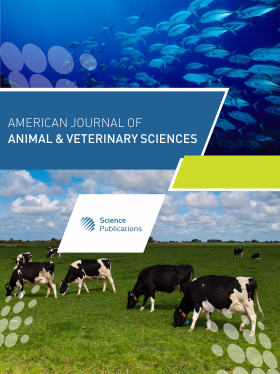Isoquinoline Alkaloids and the Ionophore Monensin Supplemented Alone or Combined on Ruminal Fermentation and Nutrient Digestibility in Steers Fed a High-Energy Diet
- 1 Facultad de Medicina Veterinaria y Zootecnia, Universidad Autónoma de Sinaloa, Mexico
- 2 Instituto de Investigaciones en Ciencias Veterinarias, Universidad Autónoma de Baja California, Mexico
- 3 Facultad de Medicina Veterinaria y Zootecnia, Universidad Nacional Autónoma de México, Mexico
- 4 Department of Animal Science, University of California, Davis, United States
- 5 Departamento de Ciencias Naturales y Exactas, Universidad Autónoma de Occidente, Mexico
Abstract
The aim of this experiment was to investigate the Influence of Alkaloids (IQA) and sodium Monensin (MON) supplementation on characteristics of ruminal fermentation, microbial protein synthesis and site and extend of digestion. For this, 4 cannulated steers were used in a 4×4 Latin square design. Treatments consisted of a high-energy basal diet supplemented with: (1) No additive (Control), (2) 15 mg IQA/ kg DM, (3) 30 mg MON/kg DM and (4) combination of IQA+MON. There were no treatment effects (P> 0.10) on ruminal and total tract digestion of OM, NDF and starch. Supplemental IQA increased (P<0.01) duodenal flow of NAN (9.2%), ruminal N efficiency (10%) and postruminal N digestion (6.2%). These effects were non-significant (P > 0.20) when IQA was combined with MON. Supplemental MON decreased (P<0.02) duodenal NAN supply and ruminal N efficiency. There were no treatments effect (P>0.43) on ruminal pH. There were no MON effects, or synergism (P≥0.23), on ruminal pH and ruminal VFA proportions. Supplemental IQA increased (P≤0.05) ruminal acetate and tended (P = 0.06) to increase acetate: Propionate ratio. Compared with control, MON did not affect (P>0.10) VFA proportions. Ruminal protozoa and total bacterial counts were decreased by both, IQA and MON when offered separately. Plasma liver enzymes were not affected by treatments. The enhancement in N utilization by steers receiving IQA supplementation can be attributed to reduced ruminal N degradation and by increased microbial N flow to the small intestine. There were no additive effects of the combination of IQA plus MON on measures of digestion.
DOI: https://doi.org/10.3844/ajavsp.2021.202.211

- 2,931 Views
- 2,359 Downloads
- 0 Citations
Download
Keywords
- Isoquinoline Alkaloids
- Feedlot
- Digestion and Fermentation
- Monensin
- Feed Additives
